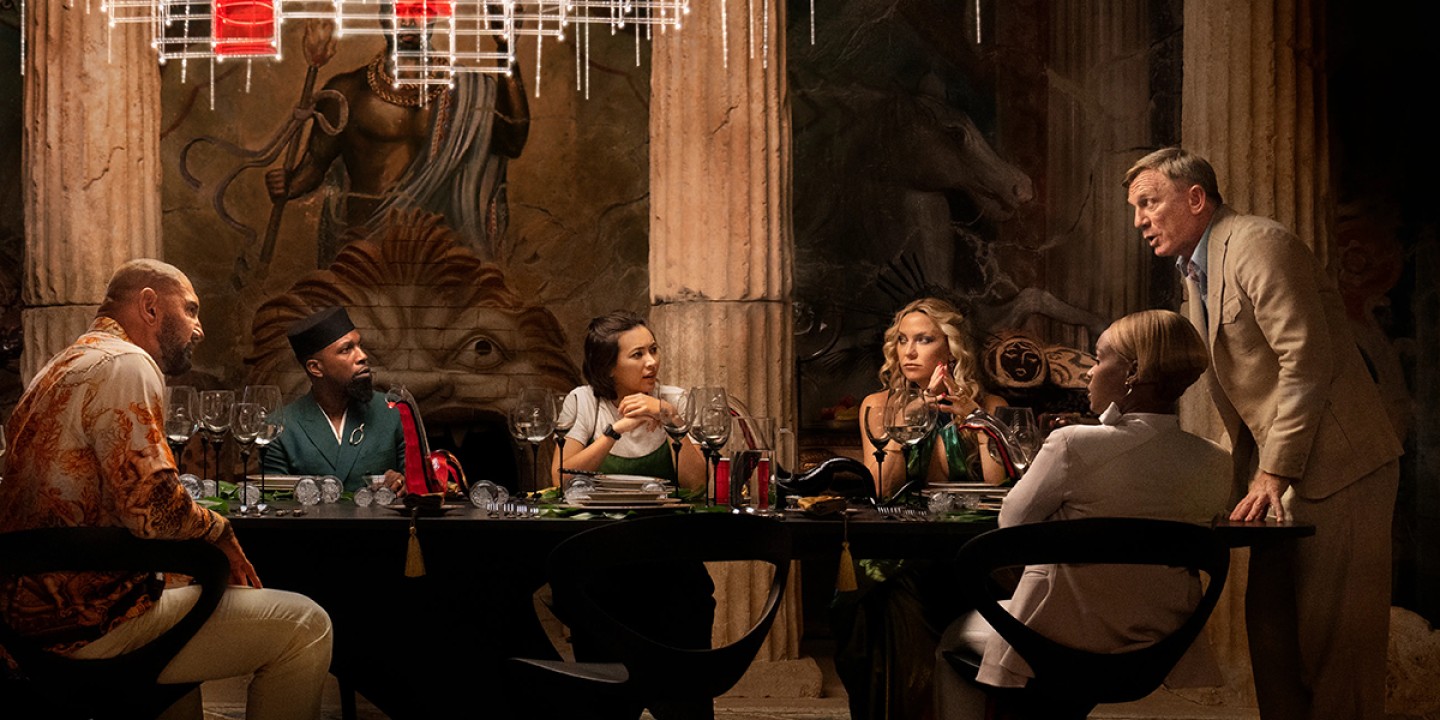Glass Onion threads the Agatha Christie needle
A murder mystery can provide sharp social commentary—and great fun.

The only problem with Rian Johnson’s new murder mystery Glass Onion (streaming on Netflix) is that by the time the main cast is gathered I would have been happy if almost any one of them was murdered. Though, as a connoisseur and master of the genre, Johnson seems to see this as a design feature, not a flaw.
A group of self-described “disrupters” have gathered at the island paradise of tech-bro Miles Bron (Edward Norton) for their annual reunion right at the start of the COVID pandemic. Bron is an incompetent narcissist who has lived in an echo chamber of fawning praise for so long he might believe his own half-baked speeches about being the only person brave enough to take down “the system.” The echo chamber resounds the loudest when he is surrounded by his oldest, dearest friends, who also happen to owe him their careers and personal fortunes. He has gathered them all on the island for an elaborate murder mystery game that, as the genre goes, turns out to be more than a game.
Read our latest issue or browse back issues.
Glass Onion follows Johnson’s wildly popular 2019 film Knives Out (one of my favorite films of the past five years), where he introduced the world to Benoit Blanc (Daniel Craig), a master detective in the grand tradition of Sherlock Holmes and Hercule Poirot, who returns in Glass Onion. Murder mysteries have never gone out of fashion, but they are having a moment of minor revival: along with Johnson’s movies there are recent films like See How They Run (directed by Tom George, 2022) and Kenneth Branagh’s adaptations of Murder on the Orient Express (2017) and Death on the Nile (2022), all three of which look to source texts by Agatha Christie, the rightful godmother of the genre.
Christie wrote in the turbulent years between and after the great World Wars, and her characters have to navigate a world where social rules are radically shifting and new systems of value—mostly nakedly capitalist systems—are replacing real or imagined networks of social connection based on land, community, and fixed social class. In these social fissures, Christie found new expression for all kinds of horrible behavior—from adultery to embezzlement to endless variations of murder. The murder mystery genre was a chance to shine a light not just on the darkness of the human soul but also on the society that gives it expression. It was also meant to be a lot of fun. Many modern incarnations of the genre are either too ironic in their use of the genre, missing its capacity for real social commentary, or far too serious in their faithfulness to Christie’s source material, missing all the fun.
A self-professed lover of Christie’s work, Johnson manages to avoid both pitfalls. In both Knives Out and Glass Onion, Johnson has his sights trained on the social fissures of our own moment: the yawning gap between rich and poor, the culpable ignorance of the ultra-wealthy who swaddle themselves against the suffering they create, and the breakdown of older models of accountability through the tech and social media economy. Which brings us back to those terrible people gathered on Bron’s island.
The only non-despicable people on the island are Blanc and Cassandra “Andi” Brand (Janelle Monáe), Bron’s old business partner who he recently cut out of his tech empire. Both are unexpected guests at the party, and much of the mystery revolves around figuring out why they are there. The rest vary only in their style of self-serving corruption: Birdie (Kate Hudson), a model turned fashion designer who thinks she is boldly resisting conformity when she tweets racist nonsense; Claire (Kathryn Hahn), the governor of Connecticut, who is in Bron’s pocket; Lionel (Leslie Odom Jr.), a brilliant scientist who can’t say no to Bron’s dangerous schemes; and Duke (Dave Bautista), a men’s rights social media guru promoting a right-wing lifestyle brand.
In the end, all of them, Bron included, owe their money and power to talent that isn’t theirs and an economy that thrives on speculation and destruction. They are so desperate to hold on to their stolen power that they barrel blindly from one disaster to the next, and it is easy to believe any one of them could murder, or be murdered by, any other one of them. This is, of course, one of the tropes of this kind of murder mystery: gathering the suspects in an isolated place, letting the consequences of their moral choices play out, watching with bated breath for the unexpected revelations as the master detective explains who did it and how. Johnson understands that we all think we have seen this movie before, and in some ways we have. His gift is not to adapt an old text but to make the genre speak in contemporary language.
In Knives Out, we need the master detective to reveal the truth to us, to see past the obvious to the hidden motives or to see past the assumed to the obvious hiding in plain sight. In Glass Onion, there are even more layers to the mystery Blanc must peel away, and the revelations and reversals are more dramatic. (I have not been in a theater where the audience laughed as loudly or gasped as audibly since, probably, Knives Out.) But does discovering the truth necessarily lead to justice? Blanc isn’t there just to solve a mystery; he is there to help the characters arrive at the truth about themselves. In doing so, he gives them a new set of choices they can make that just might matter more than solving the case.
Johnson learned this trick from Christie’s playbook too, though he is once again showing us how capacious the genre can be—and how deliciously fun.






